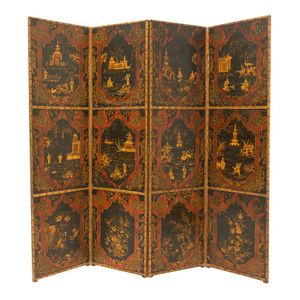Chinoiserie Leather Screen with Gilt Decoration
An antique four fold pressed leather screen in the chinoiserie style, each of the four leaves in gilt, red and black decoration divided into three cartouche panels with figures, pagodas and garden settings, 231 cm high, each panel 61.5 cm wide
You must be a subscriber, and be logged in to view price and dealer details.
Subscribe Now to view actual auction price for this item
When you subscribe, you have the option of setting the currency in which to display prices to $Au, $US, $NZ or Stg.
This item has been sold, and the description, image and price are for reference purposes only.
- Cartouche - An ornamental panel in the form of of a shield, oval or rectangular scroll with curling edges. It may be carved into the back of a chair or the top of a sideboard, or present on a piece of silver or jewellery, and contain the initials of the original owner, heraldic symbols, or some other inscription, such as the details of a presentation.
In ceramics the term defines the central area of a vase or similar with a decorative border in one of the shapes above, into which a decorative scene or figures have been painted. - Chinoiserie - Furniture and decorative items decorated in imitation of a Western interpretation of the Chinese style. The Chinoiserie style first became popular in the late 17th century, though there were frequent revivals, notably by Chippendale (hence 'Chinese Chippendale') during the Regency period, and the Anglo-Japanese style in the second half of the 19th century.
The ubiquitous 'willow pattern' is the most common 'Chinese' theme used in porcelain, while on furniture the Chinoiserie style usually has black or red painted and lacquered decoration, though the hallmark of the furniture style is the use of fretwork in geometrical patterns, pagodas and other decorative forms.
Japonaiseries, as the name implies, are motifs in imitation of the Japanese taste.
See also "Chinese Chippendale". - Panels - Timber pieces, usually of well-figured wood either recessed or applied over the frames of doors and as decoration elsewhere in the carcase of cabinet furniture. The panels may take a variety of shapes rectangular, square, shield shape, oval, half-round or in the form of Egyptian pylons.
This item has been included into following indexes:
Visually similar items

A painted and gilt Chinoiserie decorated four-fold leather screen, probably Dutch, late 18th century, 231 x 244 cm
Sold by
in
for
You can display prices in $Au, $US, $NZ or Stg.

A Spanish embossed and painted 18th century four fold screen. 83 cm high, 200 cm wide.
Sold by
in
for
You can display prices in $Au, $US, $NZ or Stg.

Baluch Sumak rug modern 153 x 101 cm
Sold by
in
for
You can display prices in $Au, $US, $NZ or Stg.

A Shiraz district rug, Iran circa 1930. Approximately 250 x 148 cm
Sold by
in
for
You can display prices in $Au, $US, $NZ or Stg.
